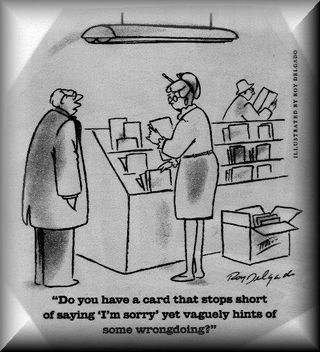Forgiveness
What’s Wrong with Apologies and How to Make Them Right
Six steps to an authentic apology that is meaningful and healing
Posted April 1, 2019
We are not taught how to make a good apology.
Remember when you were five and your parents told you to apologize to the kindergartner whose toy you grabbed? Ashamed, you cast your eyes down and said “sorry” in a whisper, and it was all over.
Later, perhaps even in adulthood, when someone asked for an apology, you might have said something like “I didn’t mean to (fill in the blank),” and “But that was because (fill in the blank).”
When you have received such an apology, has it helped you feel better? Has it mended the relationship with the person who hurt you? Has it undone the pain of what had been said or done?
This is the way apologies are taught to us, and unfortunately, it is all wrong. Saying “Sorry” is not enough. Giving excuses about why you said or did something that hurt another person does not help that person. You sound defensive when you justify your behavior, or say “I didn’t mean to hurt your feelings.” It does not acknowledge that your intention does not match the way your words or actions landed for the other person. When you try to justify or make excuses, the other person feels unrecognized, misunderstood, and blamed for having the feelings he has.
Even worse apologies are of the “I’m sorry your feelings are hurt” type. These are not apologies at all. At best, you may be able to move on, but without the healing or repair of the relationship. At worst, and in significant, long term relationships (such as marriages), the relationship may be damaged. And when the apologies are not real apologies, the damage accumulates over time.

So what is a real apology?
I believe the skill of apologizing well should be taught by parents and in schools. Here is an example of a good apology.
Let’s pretend I missed our lunch date, and you call me, upset because I “stood you up.” Here are the six steps to a real apology, and how they translate to the apology that I might give you:
- Acknowledging the action (taking responsibility for what you did). “Oh my goodness, I completely forgot! I didn’t write our date in my calendar, and I didn’t remember our plan. I stood you up!”
- The adverse impact of the action (how your words or actions affected the other person). “You must be so mad. You must have sat there, waiting for me, getting more and more irritated and confused. You might even have felt that you weren’t very important to me…”
- The moral transgression (e.g., the line that was crossed, the values or standards that were violated). “I had made this date with you, and it was a promise that I did not keep. By not showing up, I was disrespectful to you, your time, and our relationship. I think it is so important to keep promises and to treat friends with care and respect.”
- Deep and sincere expression of remorse and sorrow. “I am so very sorry that I kept you waiting and didn’t show up. Your friendship means the world to me, and I am so sorry for the hurt I caused to you. This is very serious to me, and I need to take this very seriously. I did you wrong, and I apologize.”
- Pledge of future behavior (and reassurance that this will never happen again). “I want to promise that this will never happen again. You might not believe me right now, but I am going to write down our lunch dates the minute we make the plan, and I am going to set a reminder on my phone. I am also going to make a habit of checking my calendar every morning, without fail.”
- Restitution if appropriate. “I don’t know how to make this up to you, but if you are open to it, may I treat you to lunch soon? Can we make another date for later this week?”
How did that feel? You might have noticed that I did not ask you to accept my apology. That is a rather selfish request that would only help me, and would feel like a demand to you, the recipient.
Whether or not the recipient accepts the apology is entirely up to her. Some people ask for forgiveness when they apologize. My experience is that asking for forgiveness puts the focus back on to you, instead of staying on the person to whom you have apologized, where the focus should remain. You may or may not be forgiven, but having apologized will probably help you to forgive yourself.
Sometimes people feel that the anger or hurt is unjustified, and so the other person does not deserve an apology, or an apology is not warranted. I believe that an apology is warranted whenever you have done something, intentionally or not, that hurt or angered another person. You don’t need to “fall on your sword.” You need to acknowledge the other person’s feelings and express sincere remorse for doing or saying something that caused those feelings. Even if you think you did nothing wrong.
© Ann Buscho, Ph.D. 2019


